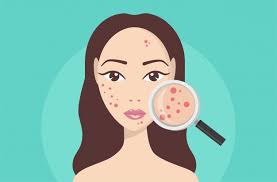
Acne is one of the most troublesome and common skincare problems for people around the world and emotionally one of the most debilitating and embarrassing skin disorders to experience. It is a skin condition characterized by pimples and blackheads on the skin, especially on the face, due to inflamed or infected sebaceous glands.

This skin condition does not only affect adolescents but also many adults. Knowing what causes acne is your first step in learning how to take control, so that you can get rid of breakouts and get back to having clear skin. Here are a few factors that can be giving you acne.
- Hormonal Activity: Hormones which influence the production of sebum (oil) and cell activity trigger most attacks, specifically Androgens that are produced by the reproductive organs.
- Medications: Medicines that contain or stimulate androgens, corticosteroids can play a role in the development of acne.
- Heredity: Researchers believe good old genetics could have a hand in whether or not a person gets acne, meaning that if your parents suffered from breakouts, you are at greater risk of suffering from them, too.

- Hormonal changes : that occurs in girls or women two to seven days before the beginning of their menstrual cycle and during their menstrual period can cause breakouts. Oil production can also increase during pregnancy, or with starting or stopping oral contraceptives.
- Sensitizing: reactions to makeup, irritating skin-care ingredients, specific foods (rarely), allergies, or medicines.
- Poor hygiene: Not cleansing your skin, high bacteria activity can be a factor also inflammation caused by squeezing or picking at blemishes.
THE SOLUTION
Always remember that acne is an inflammatory condition, which means that anything you can do to avoid inflammation,is going to help keep breakouts bay. The following are some key steps you can take to make sure acne doesn’t stick around for long .Keep skin clean, but don’t overdo it.
- Clean skin is a good thing, but washing too much will lead to irritation, especially if you use harsh cleansers or scrubs. The best way to go is to wash your skin twice a day (once in the morning, once at night) with a gentle Ph-balanced cleanser. Stay away from harsh cleansers with alcohol that can dry out the skin excessively.

- Use a toner after your cleanser or wash, these serves to remove any dirt missed during the cleansing phase. Floral water like rose water, witch hazel, Lavender, etc are better than alcohol based toners which strip the skin off all the oils on the skin and dehydrate the skin. Toners also serve as skin refreshers in between you morning and night cleanse

- Exfoliate once a week but use an exfoliant that do not contain granules, example cream based fruit acids (AHA’s) rather than granular scrubs that can further irritate the acne present.
- Choose makeup products for your skin type. If you have oily or combination skin, stick to makeup that’s labeled as being for that skin type. Avoid creamy, heavy formulas and choose powder formulas when possible.
- Remove makeup before going to bed. Sleeping with makeup on can lead to clogged pores. If you wear heavy makeup, consider following your cleanser step with a makeup remover that’s made especially for removing long-wearing makeup to ensure every last trace is gone before your head hits the pillow.

- Diet should be altered to remove foods high in fat and sugar. Plenty of fresh fruit and vegetables should be eaten as they contain vitamins responsible for maintaining a healthy skin.
- Pimples should not be picked as scaring may occur or inflammation may be increased.

- Visit a professional skincare therapist for more skin analysis and routine advanced treatments that can help improve the condition e.g galvanic cleanse facials, chemical peels.

This is a battle that can be won and the feeling of happiness when you finally have clear skin again is among the best ever
